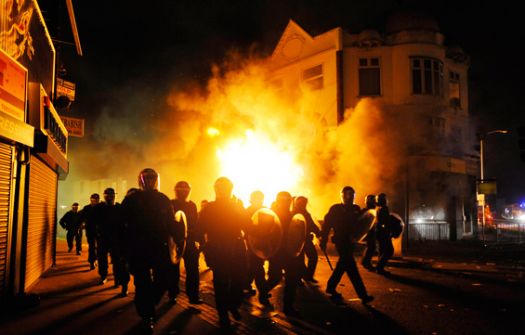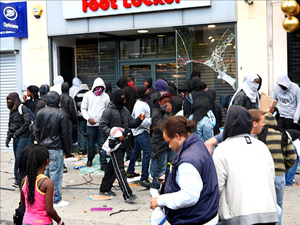Can 'Reading the Riots' study bring change and lessen tension with Black youth in UK?
By Starla Muhammad -Staff Writer- | Last updated: Dec 16, 2011 - 11:59:32 AMWhat's your opinion on this article?

British riot police walk by a burning building in Croydon, London, Britain, Aug. 8, during the third day of violence in which police clashed with rioters in Croydon and
vehicles had been set on fi re in Peckham and Lewisham. More than 200 people were arrested and 35 police officers injured. Violence erupted in reaction to a fatal
shooting incident in Tottenham, in which a policeman was injured on Aug. 4 and a local 29-year-old man, Mark Duggan, was killed by armed officers. Photo: webgate.epa.eu
|
(FinalCall.com) - Frustration, anger and dissatisfaction with heavy handedness by the police sparked the worst riots in nearly 30 years here, according to a new joint study by the London School of Economics and the United Kingdom’s Guardian newspaper. Preliminary findings from the study, “Reading the Riots,” bring issues like “stop and search” and other grievances to light. Questions remain as to what if anything will change, especially for Black Britons.
“This is a pathbreaking study of the August riots in England. It reveals the anger and frustration felt by those who were involved in the disorder, in part a product of the unfair and discourteous treatment they feel they suffer at the hands of the police, but also reflecting the disillusionment many feel at the social and economic changes which leave them increasingly disconnected from mainstream society,” Professor Tim Newburn head of the Department of Social Policy at the London School of Economics was reported as saying.

Will the powers that be finally listen to what the Black community here has been saying for years, now that rebellion, violence and police misconduct have touched the door of the UK’s White communities? |
“Over the last few years the young people have been expressing openly in our workshops and discussion forums, the level of grievance that they’ve had toward the police. How they feel it’s an ongoing war or battle. These are their words not mine,” says Trevor Hakim Muhammad, co-founder and director of Black Starline Organization, a group that mentors Black, Asian and Muslim youth in the UK.
Mr. Muhammad says the media reports he has read based on the new study do not yield any surprises for those active in the community and working with young people. “It was no shock to us and we have been trying to advise young people and parents and schools that something like this was on the horizon in this country,” Mr. Muhammad, referring to the August riots, told The Final Call.
Findings from the first phase of the study consisted of interviews with 270 rioters from London, Birmingham, Liverpool, Nottingham, Manchester and Salford. Results “found a deep-seated and sometimes visceral antipathy towards police, often related to the way in which people experience use of stop and search,” says the Guardian in a Dec. 6 online article.
The report also found what the London School of Economics calls “a pervasive sense of injustice” amongst those that took part in the rebellion. “For some this was economic—the lack of money, jobs or opportunity. For others it was more broadly social—how they felt they were treated compared to others,” reports the London School of Economics.
Symeon Brown is a member of the research team and says the findings were very profound and have started a very polarizing debate. “Of course issues pertaining to the relationship between Black communities and the police are not new but the extent to which our research uncovered this divide really must open a discussion about how stop and search is used and also police accountability if trust is to be built,” said Mr. Brown in response to questions emailed by The Final Call.
“Of those who participated in our research many articulated feeling over-policed to the point of abuse and felt their involvement was a chance at retribution—they also felt the police were not accountable for their actions,” added Mr. Brown, a senior researcher with the Black Cultural Archives.
However prior studies and reports on the glaring injustice and conflict resulting from what analysts say is racial profiling and unfair police treatment of Black youth have yet to yield any new policies, procedures or changes.
“Stop and Think: A Critical review of the use of stop and search powers in England and Wales,” a 2010 comprehensive study released by the UK-based Equality and Human Rights Commission revealed what many in the community have known for years: Blacks are stopped by police more than any other group.
According to that study, Blacks had the highest rate of being stopped and searched by police at 129 per 1,000. The rate for Asian people was 40 per 1,000, and it was 17 per 1,000 for White people. “The evidence points to racial discrimination being a significant reason why Black and Asian people are more likely to be stopped and searched than White people. It implies that stop and search powers are being used in a discriminatory and unlawful way,” reported the Stop and Think study.
A 2007 report, “Young Black People and the Criminal Justice System,” released by the House of Commons Home Affairs Committee stated more of the same in regards to what it called “the overrepresentation of young Black people in the criminal justice system.”
“Black people of all ages come into contact with the criminal justice system more frequently than expected given their proportion of the population. Excluding foreign nationals, Black people of all ages are five times more likely to be in prison than White people,” said the report.
Could a few suggestions laid out in both the 2007 and 2010 studies if even partially implemented by the British government and law enforcement have possibly prevented the 2011 riots? Will the powers that be finally listen to what the Black community here has been saying for years, now that rebellion, violence and police misconduct have touched the door of the UK’s White communities?
Mr. Muhammad says for anything worthwhile to come from the Reading the Riots study, parts of which were released Dec. 6, substantive changes must be made. He hopes the motives for the study are to help the community.
“Are you putting this information together to formulate a plan? So you go into these areas, that you normally don’t even spend any time in, to put together a program where young people learn how to go out there and build an economical base for themselves because young people may be able to tear down a community but can you teach them how to build it now?” Mr. Muhammad asked.
Mr. Brown says as part of the research team he wants a “wider policy debate that includes the voices and causes raised” from the “Riots” study. Mr. Brown is also a community organizer and is co-founder of a youth-led group in the UK called Haringey Young People Empowered. “If you are quoting me as a communitarian I want to see institutions that are accountable and people trust and policies that enable communities particularly poorer ones to have the kind of stability, support and structure that prevent riots from happening,” he told The Final Call.
Implementing strategies and programs to help young people see the value in themselves and their communities will make the information revealed in the study more relevant, says Mr. Muhammad.
“Can you make these young people socially and politically aware so they know how to tackle and take on board a Metropolitan Police system that they think does not represent them but they now know how to deal with it systematically? See is that what you’re going to do with these findings or is it just a step up for your own personal career? And that’s the question that I would have to pose to these people with their so-called revelation and findings that the people in the community knew were going on for years,” says Mr. Muhammad.
According to the London School of Economics, report findings will be published in full Dec. 14 at a conference to be followed by the second phase of the study to be completed in 2012. The second phase will include interviews with communities, police and judges, say researchers.
Related news:
Black Britons express little optimism justice will come (FCN, 12-06-2011)
UK Black leadership wants end to assault on youth, community (FCN, 09-02-2011)
Violence blooms from Europe's seeds of hate (FCN, 08-10-2011)
The UK's Monarchy and madness (FCN, 05-05-2011)
Death of reggae singer ignites protest (FCN, 05-02-2011)
UK - Elite police unit fosters fear, instead of security (FCN, 12-03-2009)
INSIDE STORIES AND REVIEWS
-
-
About Harriett ... and the Negro Hollywood Road Show
By Rabiah Muhammad, Guest Columnist » Full Story -
Skepticism greets Jay-Z, NFL talk of inspiring change
By Bryan 18X Crawford and Richard B. Muhammad The Final Call Newspaper @TheFinalCall » Full Story -
The painful problem of Black girls and suicide
By Charlene Muhammad -National Correspondent- » Full Story -
Exploitation of Innocence - Report: Perceptions, policies hurting Black girls
By Charlene Muhammad -National Correspondent- » Full Story -
Big Ballin: Big ideas fuel a father’s Big Baller Brand and brash business sense
By Bryan Crawford -Contributing Writer- » Full Story






 Click Here Stay Connected!
Click Here Stay Connected!








